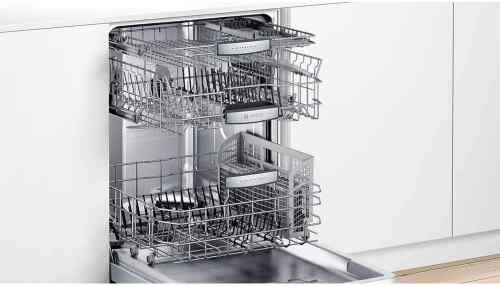Dishwashers have become a common appliance in many households, providing convenience and efficiency in cleaning dishes and utensils. If you’ve ever wondered how dishwashers achieve such effective cleaning results, one key component to consider is the heating element. In this article, we will explore the role of heating elements in dishwashers, their benefits, alternative drying methods, factors to consider when choosing a dishwasher, and address some frequently asked questions.
Table of Contents
How Dishwashers Work?
Before delving into heating elements, let’s briefly understand how dishwashers work. Dishwashers operate by spraying a mixture of hot water and detergent onto the dishes. The cleaning process involves different cycles, such as pre-washing, main wash, rinsing, and drying. Understanding these cycles will help us comprehend the significance of heating elements in the dishwasher’s operation.
The Role of Heating Elements
Heating elements in dishwashers play a crucial role in achieving thorough cleaning and drying. The primary purpose of these elements is to heat the water during the dishwasher cycle, ensuring optimal cleaning performance. By raising the water temperature, the detergent dissolves more effectively, removing tough stains and grease from the dishes.
Types of Heating Elements
There are two common types of heating elements used in dishwashers: electric heating elements and flow-through heaters. Electric heating elements, typically located at the bottom of the dishwasher, heat the water directly. On the other hand, flow-through heaters heat the water as it enters the dishwasher, ensuring a continuous supply of hot water throughout the cleaning process.
Benefits of Dishwashers with Heating Elements
Dishwashers equipped with heating elements offer several benefits that contribute to their effectiveness and efficiency.
- Improved Cleaning Performance: Heating elements significantly enhance the cleaning performance of dishwashers by heating the water to high temperatures. This helps to remove stubborn food particles and bacteria, providing a more hygienic wash.
- Energy Efficiency: While heating water requires energy, modern dishwashers with heating elements are designed to be energy-efficient. They utilize advanced technologies, such as sensors and insulation, to optimize energy consumption and reduce overall electricity usage.
- Drying Capability: Heating elements also play a crucial role in the drying process of dishwashers. By increasing the water temperature during the final rinse cycle, they promote faster evaporation, resulting in drier dishes and utensils.
Alternatives to Heating Elements
While dishwashers with heating elements are commonly found in households, there are alternative drying methods available in some models.
- Dishwashers with Condensation Drying: Some dishwashers use a condensation drying method instead of heating elements. These models rely on the natural cooling and condensation process to dry the dishes. The hot rinse water heats up the dishes, and as the water evaporates, it condenses on the cooler walls of the dishwasher, leaving the dishes dry.
- Dishwashers with Fan-Assisted Drying: Another alternative to heating elements is the use of fans for drying. These dishwashers have built-in fans that circulate the air inside the dishwasher, speeding up the evaporation process and leaving the dishes dry and ready to be put away.

Factors to Consider When Choosing a Dishwasher
When selecting a dishwasher, there are several factors to consider beyond the presence of heating elements:
- Cleaning Performance: Look for dishwashers with advanced cleaning features such as multiple spray arms, adjustable racks, and specialized wash cycles for different types of dishes.
- Energy Efficiency: Check for energy-efficient models with high Energy Star ratings, as they consume less electricity and water while maintaining optimal cleaning performance.
- Drying Capability: Consider whether you prefer a dishwasher with heating elements for thorough drying or alternative drying methods like condensation drying or fan-assisted drying.
- Cost: Evaluate the dishwasher’s price range and compare it with its features and performance to ensure you’re getting the best value for your investment.
Can I Use Dishwasher Tablets without Heating Elements?
Yes, dishwasher tablets are designed to dissolve and clean effectively even without heating elements. However, using hot water enhances their performance.
Are Dishwashers with Heating Elements Noisy?
Dishwashers with heating elements can generate some noise during operation, but modern models are designed to minimize noise levels through insulation and advanced motor technology.
Do Dishwashers with Heating Elements Use More Energy?
Dishwashers with heating elements do consume additional energy during the heating process. However, advancements in energy-efficient technologies help reduce overall energy usage.
How Long Do Heating Elements Last in Dishwashers?
The lifespan of heating elements can vary depending on usage and maintenance. On average, they can last for several years before requiring replacement.
Can I Wash Plastic Items in Dishwashers with Heating Elements?
Yes, dishwashers with heating elements are generally safe for washing plastic items. However, it’s essential to check the manufacturer’s guidelines for specific dishwasher models to ensure compatibility.
Conclusion
Heating elements are an integral part of dishwashers, contributing to their cleaning performance and drying capabilities. They ensure thorough removal of food particles, improve hygiene, and provide energy-efficient cleaning and drying solutions. When choosing a dishwasher, consider factors such as cleaning performance, energy efficiency, drying methods, and cost. With the right dishwasher, you can enjoy the convenience and efficiency of automated dishwashing while achieving sparkling clean and dry dishes.


1 thought on “Do Dishwashers Have Heating Elements”
Comments are closed.